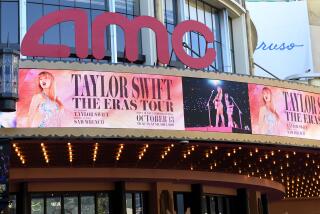Why Sony’s digital release of ‘The Interview’ changes the game

- Share via
Just a week ago, Sony was more troubled than poor giftless Bunky at Christmas. In addition to all the hacking woes, it looked pretty much done for when it came to “The Interview.” Major theater chains had dropped the Seth Rogen North Korea comedy, fearing hacking and terrorist attacks, and the group known as Guardians of Peace was on the offensive, threatening any entity that got close to the film.
But on Wednesday morning Sony pulled off one of the more improbable turnarounds in the history of movie marketing. After bringing aboard several hundred independent theaters the day before, it announced that, literally within the hour, it would make the movie available on a host of digital platforms — Microsoft Xbox, Google Play, YouTube, even a proprietary site — where consumers could rent the movie for $5.99 or buy an HD copy for $14.99.
What had been a case of a vanishing film was now, suddenly, a bold experiment. This is the first time a major studio film has embarked on what the industry calls a day-and-date release — that is, available for home viewing at the same time as it opens in theaters. (There is, it should be said, one deviation--no cable on-demand option, which is usually present in a day-and-date release.) Sony, which often seemed to be reacting as much as plotting a strategy while the hacking crisis blew up, has created opportunity out of disaster. When the dust settles, l’affaire Interview may be remembered as much for being a watershed moment in on-demand viewing as it is for any White House press conference or embarrassing emails.
Of course, such a big gambit tends to come with a big backlash--in this case, from large-scale theater owners. The talk of digital viewing had them fuming Tuesday, arguing that they had dropped the film because Sony had waffled. Now Sony was putting the movie in some theaters anyway and making it available digitally to boot. Whether you agreed or not, there was no question this was a major step. For years studios have tiptoed around what is the movie business’ third rail. Now Sony was stepping squarely on it.
Whether the math will add up for the company is an open question. Before all this went down, “The Interview” -- budgeted at $44 million with a chunky marketing bill besides -- was expected to take in about $25 million or $30 million at 3,000 theaters over the four-day weekend, which would have put the film on pace for a domestic total of roughly $60 million to $70 million. That would have put Sony’s take at about $35 million after splits with theaters.
Now? It’s hard to say. The theatrical total will be just a small fraction of that. Can the digital dollars offset the loss? Possibly, though we’ll never know for sure, since these companies are famously tight-lipped about numbers — Sony already said it would not release digital data anytime soon -- and to make a valid estimate you’d need to know the revenue splits besides. (Given the hacking risks and quick turnaround, you can bet some of these partners are getting a nice chunk of the pie.)
And then of course you’d have to ask an even more unanswerable question--namely, how many of these digital renters and buyers are people who would have bought the film either on demand or on DVD later? Even if the early totals match up, there could be a loss in ancillary revenue down the road.
Yet it seems that whether Sony is actually able to equal the dollars it would have received from a traditional theatrical release, while an important point, isn’t the only point. This is a shot across the bows. It’s one that will rankle and stay with theater owners for some time and, for all its anomalies, embolden other studios to explore similar options.
Publicly, of course, they and Sony will claim “The Interview” is an outlier. And in some ways it is. But you can bet that in the days ahead, studio executives around town will be peeking into theaters and working digital sources to find out where Sony came out on all this, watching closely to see what kind of piracy exposure it faced, not to mention looking at their own slates to see which films might lend themselves to this sort of distribution. The hacking may have breached a security wall, but Sony has opened the floodgates.
Twitter: @ZeitchikLAT
More to Read
Only good movies
Get the Indie Focus newsletter, Mark Olsen's weekly guide to the world of cinema.
You may occasionally receive promotional content from the Los Angeles Times.











